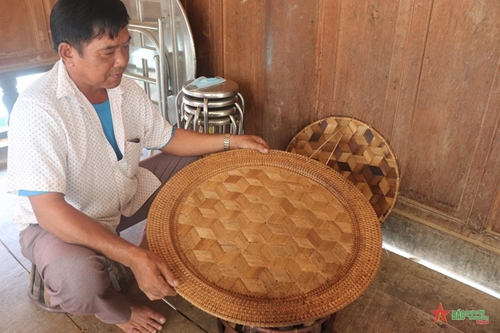Minh Tien (Tuong Duong district), one of the farthest villages to the west of Nghe An, was established more than 3 decades ago with migrants mainly from Bao Thang commune (Ky Son district). It has 127 households with 603 Khmu people. Like other villages, their traditional features are gradually falling into oblivion, including weaving - an important craft associated with many of their traditional cultural values.
In the past, most of the Khmu men knew bamboo and rattan weaving. Khmu people were taught to weave from an early age, so that they could make household utensils after getting married. Unskillful men were not well-respected and had to exchange corn and rice for the needed products. Nowadays, however, bamboo and rattan weaving is dying out because people mainly buy household items from the market.
    |
 |
|
Moong Van Tuyen, one of the few people who develops bamboo and rattan weaving in Nghe An. |
Currently, only 3 elderly men in Minh Tien village are still making bamboo and rattan handicrafts. Moong Van Tuyen is the son of Moong Van Cang, one of the pioneers who migrated from Bao Thang to Minh Tien village. Born in 1969, Tuyen learned bamboo and rattan weaving from his father and uncles. “The Khmu did not consider weaving as a profession but simply a skill to create items for daily life. I learnt naturally from everyday life. Everyone can weave, but it is more important to choose materials and learn how to make the products more beautiful,” said Tuyen.
As the only person in the village earning extra income from bamboo and rattan weaving, Tuyen still goes to the forest to find raw materials. Bamboo and rattan products are durable. Some can last even up to 15-20 years. The Khmu people now prefer only a few traditional products since items bought from the market are much cheaper and more diverse. Tuyen mainly makes products when ordered by the locals and just sells them if he has abundant raw materials. “Being at home doing nothing is very boring, so I make bamboo and rattan items. Every month, I can earn 1-2 million VND to help my children. It's not much, but it's our traditional culture,” he shared.
Bamboo and rattan weaving is associated with traditional practices, including the Khmu’s spiritual life. “The Khmu people can use aluminum trays, plastic chairs and other items bought from the market in their daily life. However, they have to use bamboo trays, rattan chairs and traditional tools during ritual practices. We have to worship our ancestors in the way they taught us,” head of the village Moong Van Quang said. The Khmu people also use traditional bamboo and rattan products to receive important guests.
Despite its strong cultural values, bamboo and rattan weaving is still falling into oblivion. Instead of learning to weave, most young people order the products from acquaintances or buy them at the market. “All Khmu people think that bamboo and rattan craft is very important, but few learn to make it and use it as a way to earn a living. Young people mainly work far from home while the children spend much time at school. In the near future, there won't be anyone to weave bamboo and rattan in Minh Tien anymore,” Head of Minh Tien village Xeo Van Duc said.
The decline of traditional crafts among ethnic minorities is quite common, not just in Nghe An but all over the country. It is difficult to make breakthroughs and help bamboo and rattan weaving redevelop because there are few markets, while tourism service activities have yet to develop and skill-transferring process is disrupted. "The local authority is interested in preserving and restoring the traditional cultural values of the ethnic groups but it is challenging due to the lack of workforce. In each village, only a few people make bamboo and rattan products to serve cultural life. Finding a new way to maintain this craft becomes urgent for the locality. It requires active support, especially from the State as well as businesses,” said Vi Dinh Phuc, Chairman of the People's Committee of Luong Minh commune.
Translated by Minh Hieu - Như Quynh - Hong Ngoc - Song Thuong